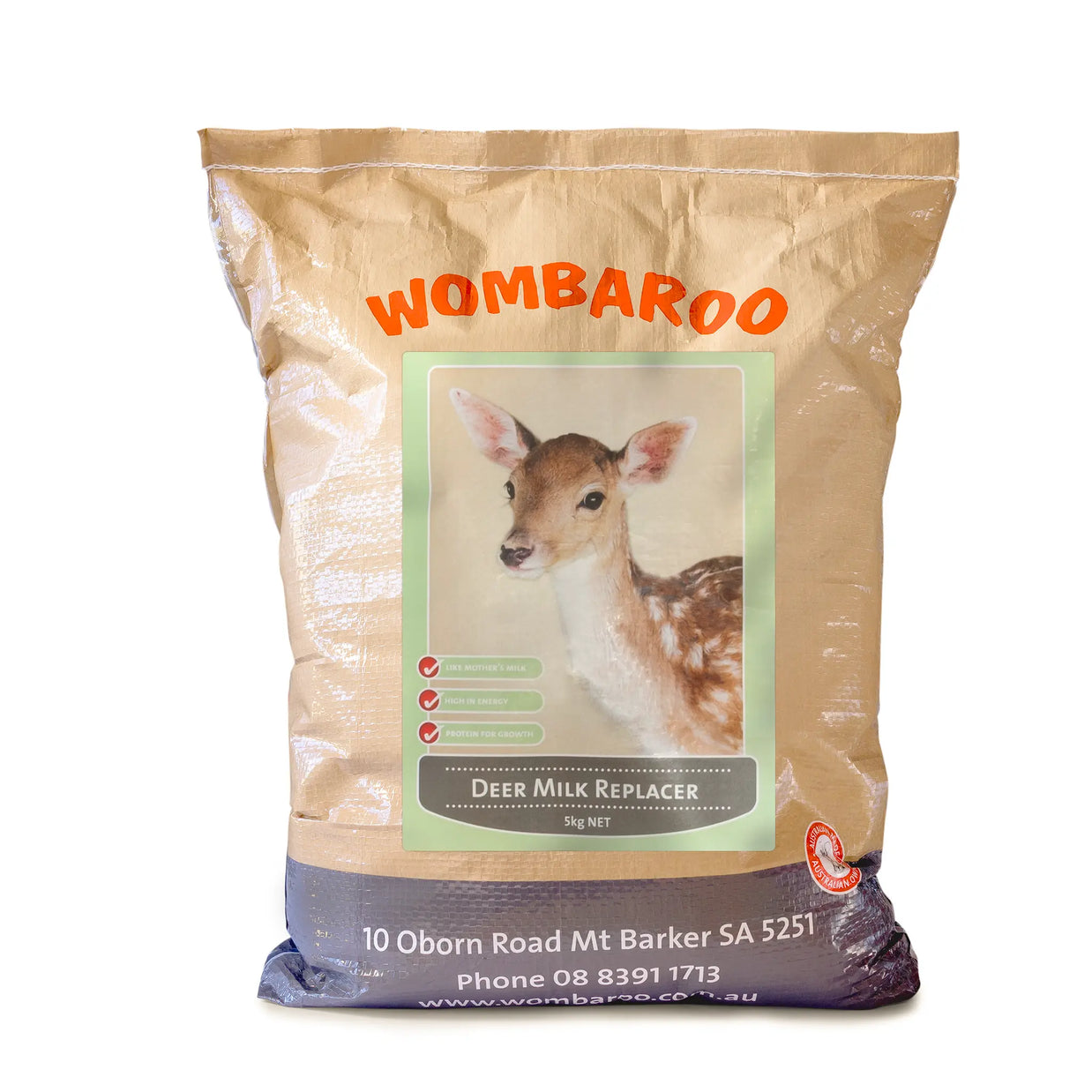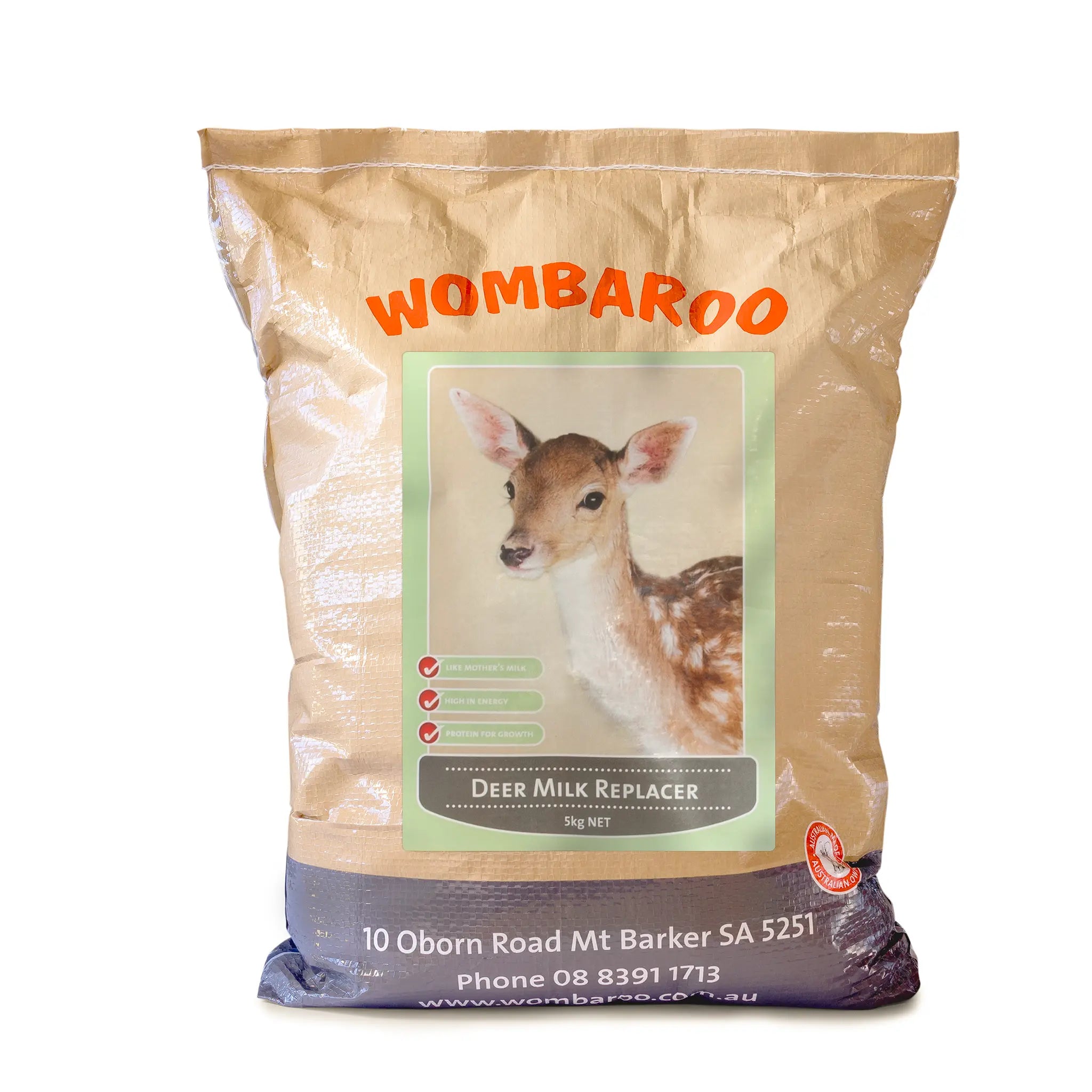Your cart (0)
Your cart is empty
Tax included and shipping calculated at checkout
Free Standard Shipping On U.S. Orders Over $100
Free Standard Shipping On U.S. Orders Over $100
Drawer menu
Tax included and shipping calculated at checkout
Subtotal: $0.00
This website uses cookies to ensure you get the best experience on your device.


High quality milk substitute for orphaned fawns. Wombaroo Deer Milk replacer is formulated to match the composition of mother’s milk, based on published scientific data for a range of species including fallow, red deer, and chital. Contains high levels of fat to support fawn’s growth and elevated levels of copper to prevent deficiencies.
Wombaroo’s Impact Colostrum Supplement to newborns that did not receive sufficient maternal colostrum.
Net wt. 5 kg (11 lbs).
Australian made high-quality milk replacers. Wombaroo’s team of experts has worked since 1984 to develop scientifically backed premium milk replacers and food for exotic animals. Wombaroo has developed products specifically for zoos and captive breeding programs to support wildlife conservation projects worldwide.
To make 1 liter of milk: mix 250g of powder to 800mL of warm water. Add about half of the water first and mix to a paste. Then combine the remaining water and mix thoroughly.
Preboil water to ensure it is sterilized, allow it to cool to lukewarm. If the water is too hot, it will cause the milk to curdle - if it is too cold, then it will be difficult to fully disperse the powder and allow it to reconstitute as a liquid.
Milk can be stored in the fridge for a day or can be frozen for up to 2 weeks.
Warm milk to about 86°F (30°C). Deer milk is high in energy which allows for low feed volumes and longer intervals between feeds, mimicking the natural care of mother-reared fawns.
Feed 4 times a day for the first week, 3 times a day in week two, gradually reducing to 2 feeds per day. To avoid dehydration during hot weather, offer drinks of water between feedings - always have clean drinking water available.
|
Weight kg |
Feed mL/day |
Weight kg |
Feed mL/day |
Weight kg |
Feed mL/day |
Weight kg |
Feed mL/day |
|
1 |
100 |
4 |
300 |
8 |
500 |
18 |
1000 |
|
1.5 |
140 |
4.5 |
330 |
9 |
550 |
20 |
1100 |
|
2 |
170 |
5 |
350 |
10 |
600 |
24 |
1250 |
|
2.5 |
200 |
5.5 |
360 |
12 |
700 |
28 |
1400 |
|
3 |
240 |
6 |
400 |
14 |
800 |
32 |
1600 |
|
3.5 |
270 |
7 |
450 |
16 |
900 |
36 |
1700 |
Whole milk solids, casein, whey protein, vegetable oils, omega-3 & 6 fatty acids, vitamins A, B1, B2, B3, B5, B6, B9, B12, C, D3, E, K, biotin, choline, inositol, calcium, phosphorus, potassium, sodium, magnesium, zinc, iron, manganese, copper, iodine, selenium.
Typical Analysis
High quality milk substitute for orphaned fawns. Wombaroo Deer Milk replacer is formulated to match the composition of mother’s milk, based on published scientific data for a range of species including fallow, red deer, and chital. Contains high levels of fat to support fawn’s growth and elevated levels of copper to prevent deficiencies.
Wombaroo’s Impact Colostrum Supplement to newborns that did not receive sufficient maternal colostrum.
Net wt. 5 kg (11 lbs).
Australian made high-quality milk replacers. Wombaroo’s team of experts has worked since 1984 to develop scientifically backed premium milk replacers and food for exotic animals. Wombaroo has developed products specifically for zoos and captive breeding programs to support wildlife conservation projects worldwide.
To make 1 liter of milk: mix 250g of powder to 800mL of warm water. Add about half of the water first and mix to a paste. Then combine the remaining water and mix thoroughly.
Preboil water to ensure it is sterilized, allow it to cool to lukewarm. If the water is too hot, it will cause the milk to curdle - if it is too cold, then it will be difficult to fully disperse the powder and allow it to reconstitute as a liquid.
Milk can be stored in the fridge for a day or can be frozen for up to 2 weeks.
Warm milk to about 86°F (30°C). Deer milk is high in energy which allows for low feed volumes and longer intervals between feeds, mimicking the natural care of mother-reared fawns.
Feed 4 times a day for the first week, 3 times a day in week two, gradually reducing to 2 feeds per day. To avoid dehydration during hot weather, offer drinks of water between feedings - always have clean drinking water available.
|
Weight kg |
Feed mL/day |
Weight kg |
Feed mL/day |
Weight kg |
Feed mL/day |
Weight kg |
Feed mL/day |
|
1 |
100 |
4 |
300 |
8 |
500 |
18 |
1000 |
|
1.5 |
140 |
4.5 |
330 |
9 |
550 |
20 |
1100 |
|
2 |
170 |
5 |
350 |
10 |
600 |
24 |
1250 |
|
2.5 |
200 |
5.5 |
360 |
12 |
700 |
28 |
1400 |
|
3 |
240 |
6 |
400 |
14 |
800 |
32 |
1600 |
|
3.5 |
270 |
7 |
450 |
16 |
900 |
36 |
1700 |
Whole milk solids, casein, whey protein, vegetable oils, omega-3 & 6 fatty acids, vitamins A, B1, B2, B3, B5, B6, B9, B12, C, D3, E, K, biotin, choline, inositol, calcium, phosphorus, potassium, sodium, magnesium, zinc, iron, manganese, copper, iodine, selenium.
Typical Analysis
